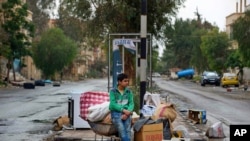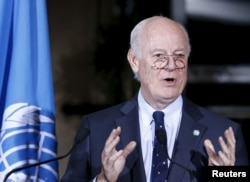The World Health Organization is urgently appealing to the Syrian government to allow life-saving surgical equipment and medications into besieged and hard-to-reach areas.
The World Health Organization reports Syrian authorities have been removing critical surgical equipment and medicines from relief convoys for years. But, it says this practice is worsening and is becoming more life threatening as people are becoming weaker and sicker after years of conflict.
The WHO notes there were nine incidents last year in which medical supplies were removed from convoys going to battle-scarred people in Homs, Aleppo, and rural Damascus. As a consequence, it estimates more than 100,000 people were deprived of vital medical support.
WHO spokeswoman Fadela Chaib says antibiotics and chronic medicines were removed from convoys recently that were going to the besieged cities of Madaya, Zabadani, Kafria, Idlib, and Homs. She says these supplies, which previously had been accepted, were now crossed off the list of approved medications.
“This is worrisome because, as you know, many people, hundreds of people need these antibiotics and medicines for chronic diseases—if not their life is at risk. Many people have diabetes, have cancer, hyper-tension. They can also suffer from asthma and if this medication is missing, their health is at risk," said Chaib.
UN Special Envoy Staffan de Mistura says he raised similar concerns with Syrian authorities on a recent trip to Damascus. He says he was assured they would allow all items to be delivered to besieged areas, except for surgical ones, atropine, and anxiety pills.
“We are still concerned about surgical items, which are not just for military use, but they can be and should be used for children for instance, which happen to be falling through the rubbles of incidents and would require this," said de Mistura.
The WHO also is calling for permission to organize frequent and lengthy medical assessment missions in blockaded areas. It says such missions would provide a comprehensive overview of the health condition of the people, so appropriate medication and treatment could be administered.





